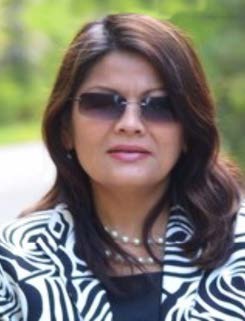HEARTSIGHT
CHRISTINA LLANES MABALOT
Staring Down the Pandemic
"As a man thinks in his heart, so is he." In other words, the quality of our thinking will determine the quality of our life. Instead of spending hours looking for bad news about COVID-19 that would make us worry more, let's use some time reflecting on our quality of thinking.
I woke up this morning with a wishful thought that today would be just another typical day, business as usual. But the cacophony of noise from the high level of activity in the house echoed the reality about our "new normal" living conditions. Our millennials are back home! Our son, his girlfriend, and our daughter are outside the bedroom, all absorbed in different virtual worlds. The household is undergoing an extreme makeover, it has become a showroom for technology devices. The dining room is now a classroom and the living room a student lounge. Hallways, strewn with luggage, and always plugged chargers, have become obstacle courses that challenge the navigation abilities of the blind. Our time zone has switched to the other side of the hemisphere, turning our nighttime to day, and vice versa.
The kids' homecoming used to be anticipated and fun. It meant vacation, travel, an active lifestyle, movie binging, unique meal concoctions, parlor games, never-ending laughing, and snacking. But this current situation is unparalleled. As the COVID-19 has suddenly frozen the world, universities have been locked down indefinitely to minimize the transmission of the deadly disease. Quarantined, our family is safer from contracting COVID-19, but domestic issues now pose a more significant threat. Cabin fever tops the list of social distancing effects, and there's no telling what insane ideas my kids can hatch when afflicted. Also impending are rifts in the family stemming from its various members getting into one another's businesses.
Personally, I feel more blind and unproductive than ever before. I have to limit touching, which is a significant source of information for people without sight. The moment I'm reminded not to touch any part of my face, suddenly, my nose gets itchy, my eyes sting, my mouth twitches – and then my fingers unconsciously scratch other parts of my hand to relieve discomfort. Ideally, I shouldn't use my hands to find and operate stuff but then, I cannot see. I also haven't mastered telekinesis. A feely-touchy person, I feel I'm in solitary confinement when social distancing. Regardless, I'm thankful I'm healthy and around family for a support system.
But what about people with special needs who have no support while under the COVID-19 guidelines for isolation and social distancing? Consider the following situations. If public transportation is limited or unavailable, how would people with disabilities who can't drive travel to pick up medicines and other essentials? Some individuals who depend on personal care and assistance are cut off from their caregivers, and some public announcements are inaccessible to people with sensory impairments. Such consequences of the social distancing guidelines directly affect the survival of people with special needs. This is not to mention the fact that the special needs community is a part of the vulnerable population who may have a higher risk of health complications from COVID-19. Significant concerns may vary in degree and are dependent on contexts specific to individuals, households, communities, and countries. But one thing is real; our community is facing a double whammy. Although our leaders are scrambling to manage this overwhelming crisis, we are a sector that's easily overlooked. So ultimately, we should all take responsibility for the care and protection of the collective health of our community with special needs. Offer to pick up food and supplies for those who are at risk, or those who can't get out if you're planning on grocery shopping. Email a gift card to someone who's out of work. In our technologically advanced era, we can always be connected even if we are unable to be physically around people. Check on friends and family by text, phone, email, or social media, to give encouragement and support as best we can.

EMOTIONAL WELLNESS: "Every time the sun sets, our fears and troubles should descend with yesterday. Let's open our hearts to this miracle of life, that a "mundane" existence has the promise of abundance, meaning, and beauty."
I'm not in a position to give a medical perspective of the COVID-19, but there are reliable sites like the Centers for Disease Control and the Mayo Clinic. With all this vague information that causes much anxiety and panic, we need facts, not fear, and several of the data, especially in social media, are hype, not truth. So I recommend not to give fear-mongering sites any your attention. I'm positive that this pandemic will end, but after it fades away, I seriously doubt some things will go back the way they were. The way we work, learn, and play, how we communicate, how we socialize, and shop, among other things, will be different moving forward. So I'd like to invite everyone to reflect in the hope of salvaging these trying times, rethink the way we live, and get the most out of this situation.
HOUSECLEANING
The call for housecleaning is worldwide as a preventative measure for contracting COVID-19. There's a lot of information out there about proper cleaning, but I'd like to throw in some unique but practical tips. If there's one thing Asian residences are known for, it's the rule that shoes aren't allowed inside the house. Bold Asians even have a sign saying, "Thank you for taking off your shoes." For most of us, it's an unspoken rule. If broken, we cringe as visitors drag their apparently septic shoes inside our sanitized homes. Footwear used outdoors should be left at the entrance area. Residents use slippers, which are strictly indoors. This practice may seem inconvenient but would help in keeping the house more hygienic. The only exceptions are for people with special needs using mobility aids. What better time to adapt this practice than now?
Work on becoming your best version of a minimalist. While most people, myself included, can't be minimalists in the full sense of the word, we certainly have paraphernalia we think are treasures that are really trash. Purposeless objects, impractical decorations, or embellishments are the most dust-gatherers. They can aggravate allergies that could lead to infections. Detach yourself from stuff, dispose, and declutter. You might also need to consider switching from paper to digital for all transactions, including reading. This way, you're protecting your household from possible health hazards while helping sustain the environment.
CATHARSIS
Often overlooked is the fact that people also need to go through mental, emotional, and physical cleansing. Man is a three-part being; body, mind, and emotions. The cleaning out of our three components can result in total wellness. Through the years, toxins have accumulated in our bodies, so we need to eradicate these health hazards. Although the processes for detoxification may seem simple enough, they are easier said than done. Consulting our healthcare providers for a natural detox diet or procedure should always be the first step. After cleaning out our physical bodies, I advise practicing good habits for eating right, resting well, moving more, working smart, and playing enjoyably for optimum physical health.
Mental cleansing is key to an overall change in the way we live, because if we can change our minds, we can improve our life. The book of Proverbs says, "As a man thinks in his heart, so is he." In other words, the quality of our thinking will determine the quality of our life. Instead of spending hours looking for bad news about COVID-19 that would make us worry more, let's use some time reflecting on our quality of thinking. Do we have a negative mindset, a hopeless outlook, or a grumbling, complaining attitude? Are we resistant to change? Do we want to improve? These are examples of questions we can ask ourselves to start a mental detox.
Emotional wellness is as essential as physical and mental. Medical science has proven that most illnesses are related to emotional problems. In fact, stress is called the mother of all diseases. Unresolved emotional issues make us susceptible to infections. While in isolation, let's do a heartcheck to address negative feelings that have been festering in our spirit.
Cleaning out our body, mind, and emotions may not be a panacea for the COVID19 pandemic. Still, the process can boost our immunity against diseases. Assuming an active part in our healthcare is our best line of defense against the COVID-19.
Before this pandemic, I felt bored with my same ol' daily routine and wished that there'd be advancement and a little excitement in my life. I never thought that a bit of change, a microscopic virus can ravage the world permanently, as it sets its crown of illness and death on people and economies. So here we are, horrified of the global pandemic, kicked out of our comfort zone to be imprisoned in our own homes. I get the message, be careful what you wish. You might regret it when granted.
Subsequently, we're forced to think of the present, and not so much of the future. If everyone in the family is healthy, and at least one person holds a home-based job, we feel blessed. During this time, a simple meal would be a feast. A lot of toilet paper and hand sanitizers would make us look prosperous. An Instagram post reads, "When everything feels uncertain, what's essential becomes clear." We're thrown back to the basics consisting of family, health, food, and shelter. The importance of life is what really matters.
The certainty of the rising sun is an indicator of a new beginning, of another chance, a clean slate. And, every time the sun sets, our fears and troubles should descend with yesterday. Let's open our hearts to this miracle of life, that a "mundane" existence has the promise of abundance, meaning, and beauty, if only we receive the gift of every new day. So I look up to our Maker and promise that I will never again call another day mundane. •

HEARTSIGHT
Christina Llanes Mabalot is physically blind from aniridia, but has a vision. She enjoys touching people's lives to bring out the best in them. "Heartsight" explains her ability to see with her heart. Christina earned her B.A. degree and Masters in Education from the University of the Philippines, Diliman, specializing in Early Intervention for the Blind. She later received Educational Leadership training through the Hilton-Perkins International Program in Massachusetts, then worked as consultant for programs for the VI Helen Keller International. She has championed Inclusive Education, Early Intervention, Capability Building and Disability Sensitivity programs. She was twice a winner in the International Speech contests of the Toastmasters International (District 75) and has been a professional inspirational and motivational speaker. Christina is blissfully married to Silver Mabalot, also physically impaired, her partner in advancing noble causes. Their children are Paulo and Jem, who has aniridia. Visit leadershiptovision.com